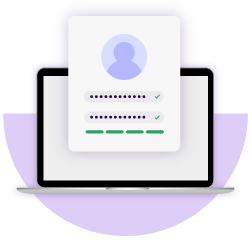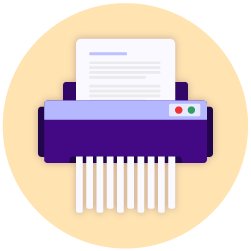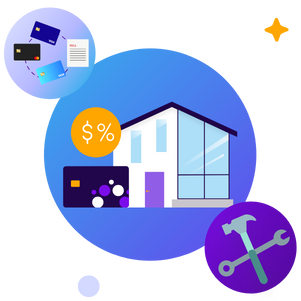April 8, 2024 | by Brian Truong

Protect Yourself From Tax-Return Identity Theft
April 26, 2022
By Chad Carpenter
Tax season is the one time of year when everyone pulls out their most private, sensitive personal information, then uses it to fill out reams of paperwork— thankfully, online these days. All that data is then sent to the IRS, hoping to only hear good news back in return. This is a time when identity theft reaches a fever pitch as scammers try to use stolen information to file other people's tax returns or pretend to be the IRS in order to get enough information for future identity theft.
Whether this is your first or your fiftieth time filing your taxes, it's important to guard your personal information and protect yourself from tax-return identity theft and tax-related data scams. Now is a vital time to protect your data and make sure that your tax return is filed exactly as it should be.
Keep Crucial Paperwork Secured at Home
 Tax return ID theft is almost always caused by someone gaining access to your social security number. Unfortunately, around tax season, your social security number can be printed on any number of documents. Tax, financial, and legal documents can all contain this information. In addition, you may have dug up your social security card recently to use for your annual paperwork.
Tax return ID theft is almost always caused by someone gaining access to your social security number. Unfortunately, around tax season, your social security number can be printed on any number of documents. Tax, financial, and legal documents can all contain this information. In addition, you may have dug up your social security card recently to use for your annual paperwork.
Once a hacker has your name, birthday, and social security number, they can file a fraudulent tax return on your behalf and gain access to your bank accounts. Key documents that contain your social security number like your SSN card, birth certificate, and employment documents should never travel with you. At best, keep secured scans of them on your phone.
As for the physical documents, keep them in a locked case or filing cabinet in your home. This way, no wandering fingers or prying eyes can simply pluck your most precious information out of your bag or off your pile of daily documents. You can even file your paperwork essentials in a safety deposit box so no one can see them and they will be available when needed. By securing your documents, you are one step closer to securing your identity.
Use Strong Passwords
 One out of four adults has "qwerty" or 12345" as their password. Only 1/3 of people use two-factor authentication, 1/3 change their passwords regularly, and 2/3 of people admit to using the same passwords across multiple accounts. If you fall into one or more of these categories, it's time for a serious upgrade in password security.
One out of four adults has "qwerty" or 12345" as their password. Only 1/3 of people use two-factor authentication, 1/3 change their passwords regularly, and 2/3 of people admit to using the same passwords across multiple accounts. If you fall into one or more of these categories, it's time for a serious upgrade in password security.
If you submit your tax returns online — the easy way — then your password is vital. If just one person successfully logs in as you, they can completely steal your private identity and financial data — and even redirect your tax returns to their address. You must have unique and strong passwords for every site that manages your finances or sensitive personal information.
Creating Strong, Memorable, and Fun Passwords
The best way to create a strong password (that you can remember) is the acronym trick.
- Start with a sentence with 10+ words (more than the min character requirement). Make the sentence funny and complicated,
- Ex: "Financial passwords have to be strong like Hercules to protect my awesome data"
- Now make an acronym from the first letter of each word
- Ex: FphtbslhHtpmad"
- That's pretty much nonsense, but it's not done. Now replace a few letters with numbers and symbols as it makes sense to you.
- Ex: Fph2B57H2pm@d"
- Now, each time you type in the password, say the acronym sentence back to yourself to help reinforce it in your memory.
Another solution is to use a password generator from a trusted source such as LastPass. With these tools, you can determine the character length, characters included, and other details to automatically generate a strong password. If you use one of these tools, make sure to write down the password you use and keep it in a safe and secure location.
Protect Against Computer Virus and Spam
 Your computer is the key to most of your personal data, especially if you are handling your finances and tax filing online. You will be typing your social security number, accessing your bank accounts, and logging into your tax account with the IRS. If your computer is compromised with a virus, all that data — and your identity— could be at risk
Your computer is the key to most of your personal data, especially if you are handling your finances and tax filing online. You will be typing your social security number, accessing your bank accounts, and logging into your tax account with the IRS. If your computer is compromised with a virus, all that data — and your identity— could be at risk
Today, computer viruses are everywhere. They, and spam/phishing emails, are basically automated malicious programs that rove the internet looking for targets. When a target is found, often the goal is to steal data and send it back to the origin hacker's database of stolen identities. Make sure your computer has the latest anti-virus and firewall software installed. Ensure both programs are configured to suit your network and close all unused ports. You can even set up things like spam detection and advanced email filters to help keep you safe from unwanted self-downloading malware.
Keep Financial Information Private
Scammers often try to steal your personal information through trickery instead of hacking prowess —by just asking for your details over the phone or through an email. They may claim to be the IRS, the IRS Advocates program, or even your bank regarding your recent tax return. The scammer pretends to be an official entity so you will trust them and reveal your most personal identity information.
Some scams may claim a medical emergency. Some may offer you more money, or threaten that you owe more money. Some will offer to help you, and some will ominously threaten you until you hand over the data.
But here's the catch: the IRS will never, ever cold-call you. They prefer to send their surprise messages by mail. Your tax returns or any additional steps you need to take will arrive by mail, not emails or phone calls. So, if you have "someone" on the line claiming to need your social security number read out to them, there is a 99% chance that it's a scammer looking to steal your identity.
To help achieve ultimate data safety, never read out personal information. Very few people really need your social security number or to see your birth certificate. So just keep your personal and financial information private at all times.
Shred Documents and Solicitations
 Last but not least, remember when to shred. Most professionals under the age of 40 today may not even own a shredder. Why shred when everything is digital? Unfortunately, not everything is digital. The IRS and many banks still prefer to send their details by mail — which means there are now printed documents featuring some or all of your private financial data. Promotional offers that feature your data or, worse, have an empty form to fill out in your name, are also dangerous.
Last but not least, remember when to shred. Most professionals under the age of 40 today may not even own a shredder. Why shred when everything is digital? Unfortunately, not everything is digital. The IRS and many banks still prefer to send their details by mail — which means there are now printed documents featuring some or all of your private financial data. Promotional offers that feature your data or, worse, have an empty form to fill out in your name, are also dangerous.
Make sure that all documents with your data are shredded, not just thrown in the trash. Did you know that many of the original forms of identity theft — before the internet — started with stealing mail out of trashcans and mailboxes? So don't keep a paper trail in the trash. Shred any sensitive documents that you don't keep locked up for personal records.
If you don't own a shredder, Wellby offers Shred Days once a year so keep an eye on our events calendar to know when you can visit a solution near you and shred your old documents! This will also give you the opportunity to discuss your information's safety with one of our team members. We are more than happy to help you get the most out of our safe and secure online banking platforms and help you keep your personal information out of wrongdoers' hands.
Chad Carpenter hails from Dallas, Texas, and lived in Denver, Colorado, for 15 years before landing in Houston. Chad has over 20 years of marketing and SEO experience, including several years in the agency world. When he’s not clacking away on his keyboard optimizing Wellby's digital presence, digging into data, or immersed in AI, Chad enjoys good food, good friends, and good movies (just don’t expect him to watch any in interactive 4D). Chad has two cats, one that loves him and one who is aloof.
Related articles you might like
March 11, 2024 | by Chad Carpenter
Top 5 Ways to Improve Your Credit Score
January 30, 2024 | by Team Wellby




